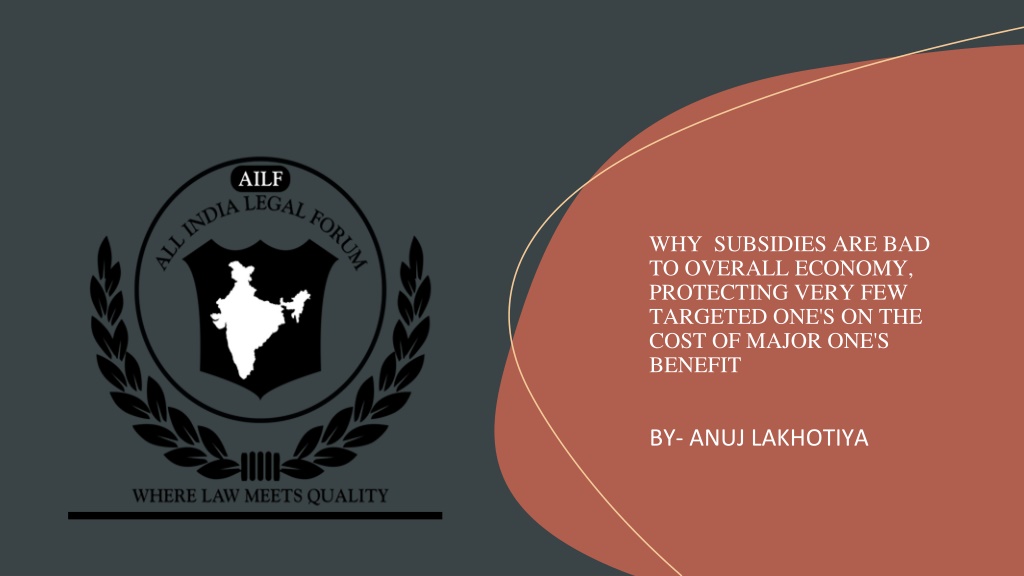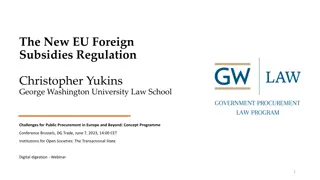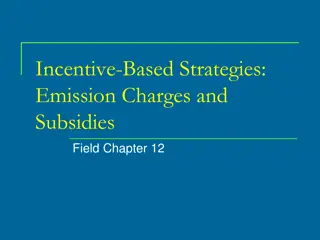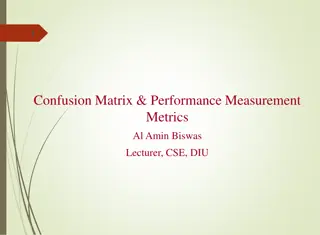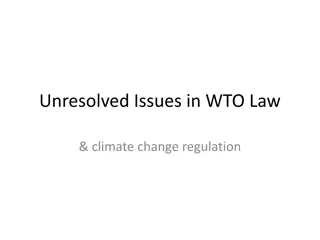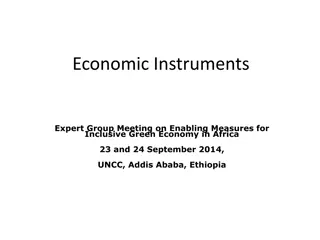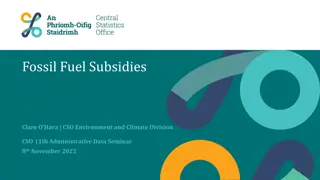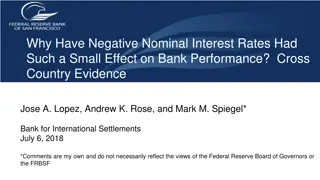Negative Impact of Subsidies on Overall Economy
Subsidies, while intended to benefit specific groups, can have detrimental effects on the overall economy. They can promote inefficiency, increase fiscal deficits, and lead to market distortions. Different types of subsidies such as production, consumption, export, and employment subsidies can create imbalance in the market, impacting both producers and consumers negatively.
Download Presentation

Please find below an Image/Link to download the presentation.
The content on the website is provided AS IS for your information and personal use only. It may not be sold, licensed, or shared on other websites without obtaining consent from the author.If you encounter any issues during the download, it is possible that the publisher has removed the file from their server.
You are allowed to download the files provided on this website for personal or commercial use, subject to the condition that they are used lawfully. All files are the property of their respective owners.
The content on the website is provided AS IS for your information and personal use only. It may not be sold, licensed, or shared on other websites without obtaining consent from the author.
E N D
Presentation Transcript
WHY SUBSIDIES ARE BAD TO OVERALL ECONOMY, PROTECTING VERY FEW TARGETED ONE'S ON THE COST OF MAJOR ONE'S BENEFIT BY- ANUJ LAKHOTIYA
SUBSIDY IS NOTHING BUT AN INCENTIVE GRANTED BY THE GOVERNMENT TO BUISNESSES OR INDIVIDUALS IN CERTAIN FORMS OF GRANTS, CASH, OR TAXES, THAT AIMS TO UPGRADE THE SUPPLY OF SERVICES AND COMMODITIES IN THE MARKET. WHAT ARE SUBSIDIES ? WITH SUBSIDIES, CERTAIN CLASS OF PEOPLE CAN ACCESS CHEAPER SERVICES AND COMMODITIES TO PROMOTE CONSUMPTION AND ENCOURAGE PRODUCTION. THESE SUBSIDIES, ARE COVERED UNDER THE REVENUE EXPENDITURE OF THE GOVERNMENT, THUS THE GOVERNMENT DOES NOT BEAR ANY LIABILITY AND MAKES NO ASSET FROM SUBSIDIES.
TYPES OF SUBSIDIES PRODUCTION SUBSIDY - This sort of subsidy is granted in order to promote the production of a product. In order for manufacturers to encourage their production output, the government compensates for some of its parts to lessen their expenses while increasing their output level. Therefore, production and consumption grow, but the price remains constant. The main drawback of such an incentive is that it may promote overproduction. CONSUMPTION SUBSIDY This type of subsidy is in place when the government offsets the costs of Education, Food, Water & Healthcare for Societal benefits. EXPORT SUBSIDY - An obvious fact is that a country or state earns from its exports and exports help to balance its economy. That is why, to encourage exports, the government subsidizes the cost. However, this can be easily abused, especially by exporters who exaggerate the prices of their goods so that they receive a larger incentive, eventually raising their profits at the expense of taxpayers. EMPLOYMENT SUBSIDY - This incentive is given by the government to companies and organizations in order to enable them to provide more job opportunities.
HOW SUBSIDIES HURT ECONOMY AT LARGE 1. TENDS TO PROMOTE INEFFICIENCY : The government provides subsidies to small producers, in order to protect them from competition, this leads to market flooding of Inefficient commodities and services, affecting Macro economics in a negative way. Such subsidies by the government leaves very less vaccum for small producers to promote efficiency of their buisness for market competition.
HOW SUBSIDIES HURT ECONOMY AT LARGE 2. FISCAL DEFICIT INCREASES : Since these subsidies create a burden on the government, to continue the grants provided, this leads to creation of a burden on the government's accounting, in order to maintain that, the government has to adjust while increasing the Fiscal deficit, discouraging economy in a direct sense.
3. BURDEN LIES ON THE TAXPAYER : The expenses done by the government on the subsidies, tends to come from people, in form of taxes, these people may not be able to enjoy the commodities or services since the subsidies are made for specific classes. This practice creates additional burden on the taxpayers, which might discourage him/her from paying taxes. HOW SUBSIDIES HURT ECONOMY AT LARGE
HOW SUBSIDIES HURT ECONOMY AT LARGE 4. LEADS TO OVERPRODUCTION : The production subsidies, that is granted for encouraging production, ultimately leads to lessen the demand of the product or service, leading to over-production in the market, a bad practice for capitalized economy, often leading to decrease in price and causing deflation.
HOW SUBSIDIES HURT ECONOMY AT LARGE 5. DISCOURAGES AGRICULTURAL COMPETITION : The subsidies offered on agricultural products including food grains, makes the producer of that product I.e., farmer produce that particular crop for 'safe income', the much contended practice of granting Minimum Support price, makes the farmer overproduce the crop for the minimum income, needless of its quality, floods the government's stock.
HOW SUBSIDIES HURT ECONOMY AT LARGE 6. BAD PRACTICE FOR MARKET : The fact that only a specific class of people get the grant of Subsidy, resulting in Unfair competition, Cheaper and inferior goods, inefficiency in market, implies that the market is affected adversely. This directly affects the GDP of country, thereby creating an impact on budgetary allocation.
HOW SUBSIDIES HURT ECONOMY AT LARGE 7. BURDENS THE ECONOMY : If the country generates more revenue than its budget then subsidies are burden to economy, as seen in India, Where the government transcends the burden on economic institutions by taking grants from International lending organization, other nations, or Reserve Bank of India.
HOW SUBSIDIES HURT ECONOMY AT LARGE 8. AFFECTS EXPORTS : The export subsidies offered raises the domestic price, and in case of a large country like India, reduces the foreign price. These subsidies increases the quantity of exports leading to a price wedge, equal to the subsidy value, between the foreign price and the domestic price of the product, for which India has to face consequences at international level,, often at World trade organization.
HOW SUBSIDIES HURT ECONOMY AT LARGE 9. HIGHER TAXES : The government raises for these subsidies by Increasing Taxes. So it is the corporations and general population who bear the burden of these subsidies, which apparently they don't enjoy, provide the means to the government for granting subsidies. In times of economic slowdown, the taxpayer is the worst affected by the burden, in India, estimates show that very less percentage of citizens pay tax, those who pay the tax, often don't get to enjoy the services for which the tax has been paid !
HOW SUBSIDIES HURT ECONOMY AT LARGE 10. DISCOURAGES GLOBAL COMPETITION : A global buisness needs fairness and competitiveness to survive in the international market, the very principles of fairness stands in violation when subsidised goods and services reach in international market which leads to unfair competition. India have had faced many protests and bashing in the past for its subsidization policies, espacially at WTO and OECD. This also discourages India's bilateral and multilateral trade with partner countries, thus affecting foreign trade relations. This Photo by Unknown author is licensed under CC BY-SA.
SUBSIDIES TEND TO CREATE MORE PROBLEMS THEN SOLVING THEM Subsidies were brought in for societal benefit, to promote the backward economic class, however due to non-coherent planning and implementation, this program offers more disadvantages than its good aspect. The government by making subsidy a revenue expenditure has furthered the problem, the taxpayer, who don't actually gets to enjoy for what he pays, bears the burden. The corruption involved in implementation worsens the situation, the subsidies don't reach to person it was meant for, though this is being solved by enabling direct benfit transfer (DBT), proper implementation is still lacking.
CONCLUSION Subsidies by the government is a policy issue, the need of the hour is to recognize that even if it provides benefits to certain class, the Elephant of the room I.e., Economic wellness of country is ignored. Better implementation of few subsidies, which have shown actual benefits, like on LPG shall be strived for, subsidies which promote agricultural and primary industry directly. Cutbacks of these subsidies would be a significant step, that shall be undertaken for economic interest, as these subsidies hinder growth, create unfair competition, and discourages market economy, hurts international trade, discriminates as against the honest taxpayer.
